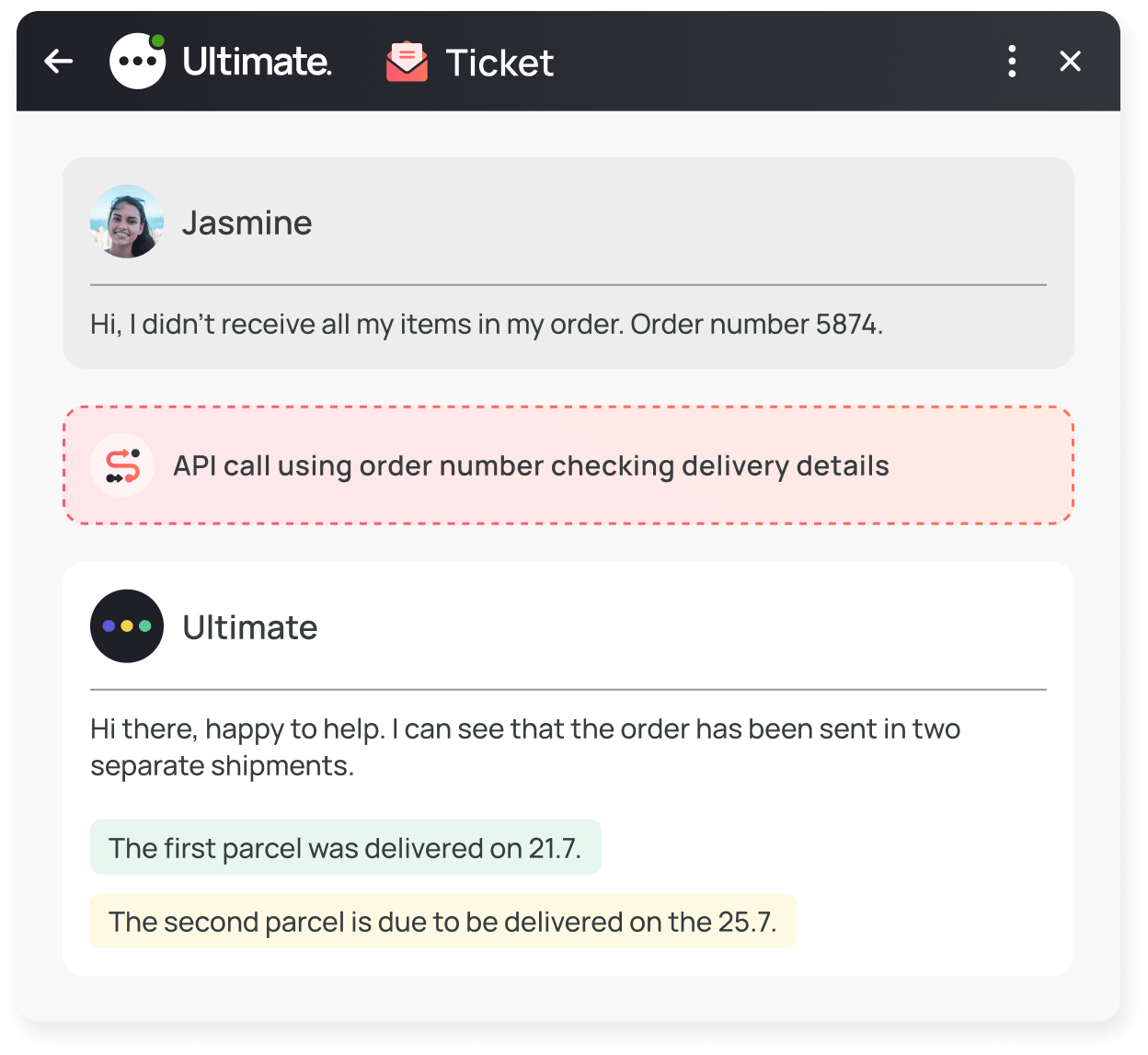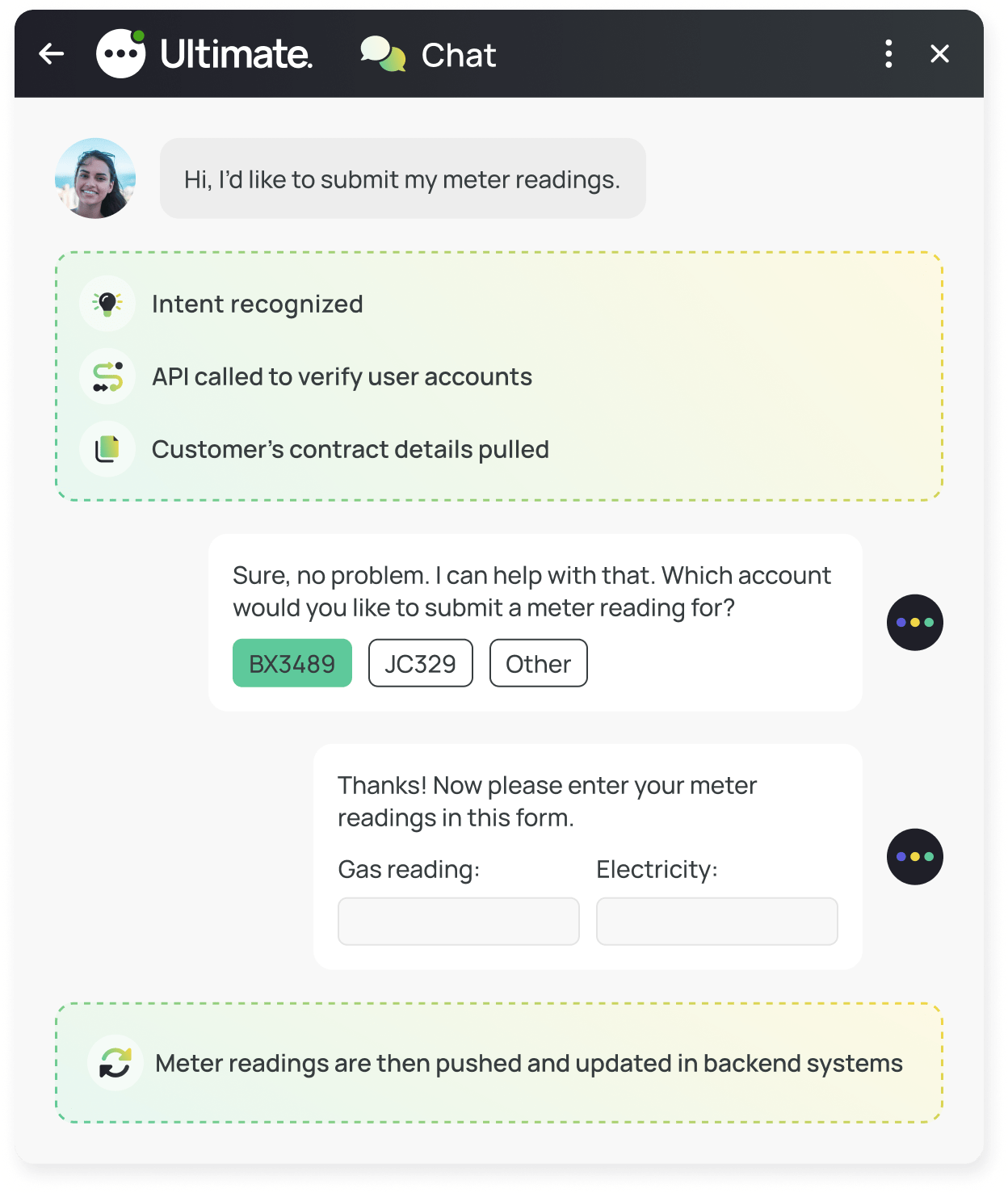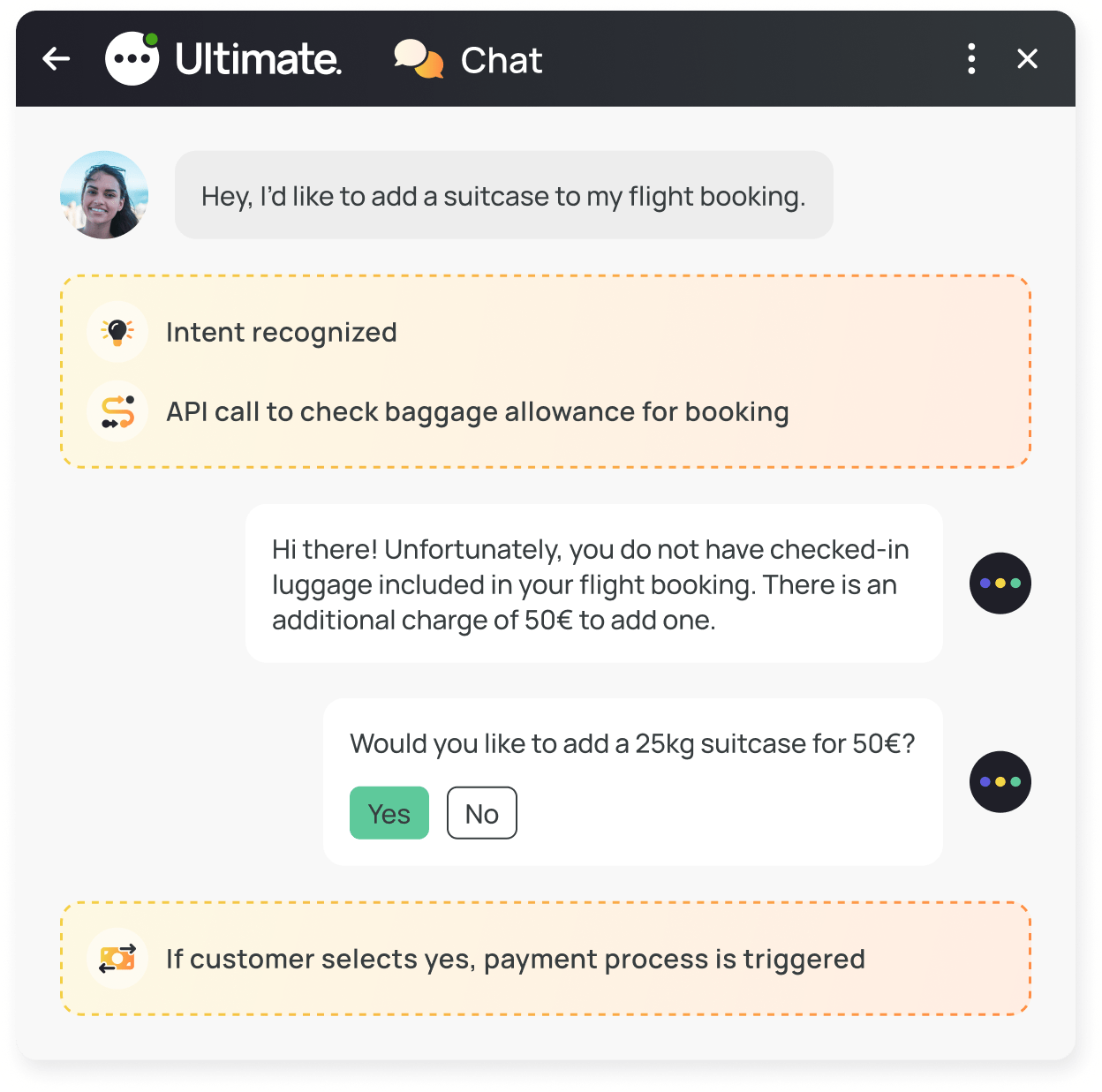What is an API?
An API, short for Application Programming Interface, is essentially what it says on the tin: An interface that enables different apps to exchange information with each other. In support automation, common examples include an API making it possible for your chatbot to receive info from your CRM, or for your virtual agent to pull data from your back office software.
When an ecommerce customer asks about the status of their order, a customer in travel asks about a seat change, or a fintech customer wants to know how far along their transfer is, a virtual agent can fetch the answer to their questions by calling an API to retrieve the info from the backend software the company is using to store it. In ecommerce, that would likely be a shipping management application. In travel, your airline’s seating database. In fintech, the backend software that manages transactions.
“Imagine an API as a door to an external system. Opening that door helps receive data from that system,” explains Mats Kipper, Senior Product Manager at Ultimate.
The only caveat? The “door” doesn’t just open automatically, and it can’t know what data you want from it until you tell it exactly what you need to know. That’s why we talk about “calling an API”. We’re ringing the doorbell to get in.
How do API integrations make your support more efficient?
Because APIs can be used to provide data from any program and your virtual agent platform, they are critical to a range of tasks that ultimately make your support faster, smarter, and more personalized: As mentioned, an API can help your VA pull information from your CRM. At Ultimate, we use native integrations with all major CRM providers like Zendesk to do this.
One of the perks that come with this is personalized dialogue flows. Native integrations make all the customer data stored in your CRM available for your virtual agent to look up with only a few clicks, the same way a human agent could. So chat dialogues and email conversations can be personalized based on language, location, and many additional parameters. The API is what provides that info to the virtual agent. For example, customers using our Zendesk Sunshine conversations integration can use APIs to modify their avatar in the Sunshine Conversations chat widget.
But even businesses that don’t use one of our native CRM integrations would be able to use their CRM with Ultimate — as long as they’re using an API to (securely!) unlock their customer relationship management data, or willing to call Ultimate's public API — the door to our industry-leading virtual agent platform with all of its joyful automation capabilities. Using custom integrations, we help our customers personalize conversation flows and improve handle times with programs like Shopify, SAP, and Stripe.
Improving automated customer experiences with APIs
Speedy self-service is a huge plus for customer satisfaction, and APIs can help automate certain support requests end-to-end. For example, Papier, an ecommerce company we work with, lets their virtual agent retrieve information from their back office system, Sorted. The way it does this is by calling Sorted’s API to retrieve a shipment status in real time. The virtual agent then passes that information on to Papier’s customers 24/7 via the chat widget.
Decreasing agent handle times with APIs
And even if the dialogue flow or email exchange does require escalation to a human agent, APIs can trigger the escalation and create a seamless agent handover by helping the VA auto-fill data and automatically create tickets. For example, a virtual agent can call an API to help authenticate users, a frequent use case we see among our igaming or fintech customers. Automated authentication helps shorten conversations, minimize admin for human agents, and decrease agent handle times.
Producing natural conversational experiences with generative AI
The dawn of generative AI has also enabled chatbots to relay the info retrieved from your backend systems in a natural, conversational way. As a result, you can automate to provide prompt, round-the-clock support without skimping on the quality of your CX. When a request does get escalated, generative AI can also help your human agents draft support macros by crafting suggested replies based on the info that your API integration provides. This will also help make their lives easier.
Top API use cases for customer support
Order tracking
Perhaps one of the most important dimensions of ecommerce CX is that your customers' orders actually wind up in there hands. Therefore, comprehensive order tracking is crucial, and it can be automated. For example, imagine that a frustrated customer submits a ticket saying that their order is missing, and she wants an immediate answer on the order status. With the help of an API , can use the customer's order number to locate the package's whereabouts. Within seconds the issue can be clarified and your customer has the information she needs.

With the help of APIs, Ultimate's chatbot is able to locate the whereabouts of this customer's package.
Managing subscriptions
APIs can help customers to securely address their queries via your chatbot. They enable email verification that allows chatbots to access a customer's account, which can be useful for providing support across many different industries. When a customer wants to change, update, or cancel a subscription, for example, they can simply share their email address with your chatbot who can then use an API to locate the account in your database. The uses of this function are far reaching. For example, if a customer wants to submit his meter reading to his energy provider, he can do so directly in the chat, as the API connects the chatbot with the account in the provider's backend where the data can then be entered directly into the system.

APIs also enable our bots to verify and access user accounts so this customer can add her meter readings right in the chat.
Changing reservations
APIs can also play a key role in automating common queries in the travel industry. For instance, they make it possible for customers to do things like change the time of a reservation or add additional baggage to their booking. This will make your customer service team's lives a lot easier by cutting down on some of the more mundane ticket requests while allowing your customers to take more control over their travel plans. When a customer has already booked a flight and wants to add a checked bag, they can simply write your chatbot who can then use an API to access your backend and check the baggage allowance for their booking. Your bot can then facilitate a payment for an additional checked bag if need be. This means they can spare the hassle of showing up extra early to wait in line at the ticket counter.

Once the chatbot recognizes the intent, it can call on an API to check the specific baggage allowances associated with the reservation, and walk the customer through what to do next.
There are many possible use cases for APIs, which span across industries ranging from travel to telemedicine. Browse our use case library for more info on how they can enhance your own support. No doubt, APIs are crucial mechanisms to making CX automation effective, as they help to integrate your backend systems with your customer facing support.
